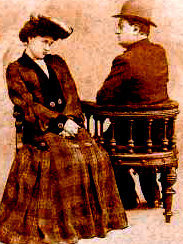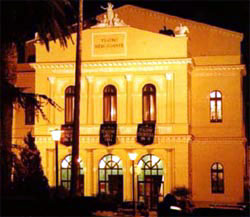 Naples, 2 August 1886
Naples, 2 August 1886
...In spite of everything, I'm in a good mood today. Do you know why? Because I worked on my Guglielmo the whole night. How beautiful is my poor Ratcliff! Last night I had trouble because my hand hurt me, but I worked gladly and with enthusiasm ... I have found the music for the "London Narrative" in the first act and also that for "Douglas' Journey" and am very pleased with them since they preoccupied me very much. By now I have all of it and soon will have finished the whole opera ... In the fourth act I have written two new things: the first when William has killed Maria and wants to kill the specter—it is robust to excess; here I have brought back a phrase from the third act, when William has fainted, and it seems to me that I have hit the bullseye with great effect."
"...but after a month we were once again disbanded due to the dissoluteness of the company and I was left without work for a good month and a half. I did not waste my time; my entire lunch was a plate of macaroni; but meanwhile I worked full strength at composing and orchestrating the opera which rapidly grew under my eyes to a fine quantity of music sheets which I religiously placed in a suitcase. It was the treasure of my future; at least so I imagined ...
"Then I signed with [Luigi] Maresca, still at the Teatro del Fondo, and then began again the usual peregrinations. From Naples to Benevento for a few performances; from Benevento to Foggia; until at last, on 29 December, 1886, we arrived at Cerignola, in the Puglie.
 Cerignola, 17 February, 1887
Cerignola, 17 February, 1887

Luigi & Elodia Maresca | "In Naples I signed a contract with a company of the lowest level ... I signed because I could no longer live in Naples (I left a mountain of debts which I am paying off day by day, even denying myself a cigar); besides, I signed on with one great hope: to come to Milan at Lent. You inderstand that this would have been a piece of luch for me: I would have seen you and you would have heard my poor Guglielmo ... Now this hope has vanished because the company is to go to Sicily ... |
| "I stayed [in Cerignola] for the entire Carnival of '87 with Maresca; the pay was ten lire a day, sufficient for my needs and my wife's. But that uprooted my life. Finding myself in that atmosphere of vendettas, jealousies and gossiping cured me of the desire to continue. I played the piano rather well and felt myself inclined, through a natural communicative ability, to teach others.
"At Cerignola I was well-liked by everyone, beginning with the Mayor, Cannone, and everyone encouraged me to leave the company and become a piano teacher. Maresca knew about these innocent intrigues and one day called me to the stage and told me that I was wrong to leave him; that in a few days we would have gone to Sicily and I would have done badly to listen to the advice of false friends.
"Now I don't remember how it happened any longer, but the fact remains that Maresca answered very excitedly to my replies; he got angrier, became infuriated and ended by hitting me. I was not very impressed by his system of persuading people to renew a contract, and reasonably considered myself excused from any obligation.
|

Cerignola

Teatro Mercadante in Cerignola
|
"I had the most authoritative citizens of Cerignola for my friends, and in accord with them I resolved to slip away. I was not afraid of causing difficulties for the company since I knew that Maresca had already engaged another, Balsimelli, and that he was soon to join them in Sicily.
"Here then is the plan that I evolved. We had come to the evening of the season's last performance and in the early hours of the afternoon I had sent my luggage and the famous suitcase which held the manuscript of Guglielmo Ratcliff to the house of a friend's family. My wife was to wait for me there..."
[Note that although Mascagni refers to his wife here in 1887, and was living with Argenide Marcellina Carbognani (Lina) in Cerignola, but they did not marry until 1889.—JM]